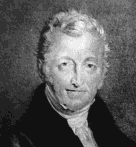 |
| Thomas Robert Malthus |
Thomas Robert Malthus was the first economist to propose a systematic theory of population. He articulated his views regarding population in his famous book, Essay on the Principle of Population (1798), for which he collected empirical data to support his thesis. Malthus had the second edition of his book published in 1803, in which he modified some of his views from the first edition, but essentially his original thesis did not change.
In Essay on the Principle of Population,Malthus proposes the principle that human populations grow exponentially (i.e., doubling with each cycle) while food production grows at an arithmetic rate (i.e. by the repeated addition of a uniform increment in each uniform interval of time). Thus, while food output was likely to increase in a series of twenty-five year intervals in the arithmetic progression 1, 2, 3, 4, 5, 6, 7, 8, 9, and so on, population was capable of increasing in the geometric progression 1, 2, 4, 8, 16, 32, 64, 128, 256, and so forth.
This scenario of arithmetic food growth with simultaneous geometric human population growth predicted a future, when humans would have no resources to survive on. To avoid such a catastrophe, Malthus urged controls on population growth.On the basis of a hypothetical world population of one billion in the early nineteenth century and an adequate means of subsistence at that time, Malthus suggested that there was a potential for a population increase to 256 billion within 200 years but that the means of subsistence were only capable of being increased enough for nine billion to be fed at the level prevailing at the beginning of the period. He therefore considered that the population increase should be kept down to the level at which it could be supported by the operation of various checks on population growth, which he categorized as "preventive" and "positive" checks.
The chief preventive check envisaged by Malthus was that of "moral restraint", which was seen as a deliberate decision by men to refrain "from pursuing the dictate of nature in an early attachment to one woman", i.e. to marry later in life than had been usual and only at a stage when fully capable of supporting a family. This, it was anticipated, would give rise to smaller families and probably to fewer families, but Malthus was strongly opposed to birth control within marriage and did not suggest that parents should try to restrict the number of children born to them after their marriage. Malthus was clearly aware that problems might arise from the postponement of marriage to a later date, such as an increase in the number of illegitimate births, but considered that these problems were likely to be less serious than those caused by a continuation of rapid population increase.
He saw positive checks to population growth as being any causes that contributed to the shortening of human lifespans. He included in this category poor living and working conditions which might give rise to low resistance to disease, as well as more obvious factors such as disease itself, war, and famine. Some of the conclusions that can be drawn from Malthus's ideas thus have obvious political connotations and this partly accounts for the interest in his writings and possibly also the misrepresentation of some of his ideas by authors such as Cobbett, the famous early English radical. Some later writers modified his ideas, suggesting, for example, strong government action to ensure later marriages. Others did not accept the view that birth control should be forbidden after marriage, and one group in particular, called the Malthusian League, strongly argued the case for birth control, though this was contrary to the principles of conduct which Malthus himself advocated.
***********
Karl Marx's Theory of Population
Karl Marx (1818-1883) is regarded as the Father of Communism. He did not separately propose any theory of population, but his surplus population theory has been deduced from his theory of communism. Marx opposed and criticized the Malthusian theory of population.
According to Marx, population increase must be interpreted in the context of the capitalistic economic system. A capitalist gives to labor as wage a small share of labor's productivity, and the capitalist himself takes the lion's share. The capitalist introduces more and more machinery and thus increases the surplus value of labor's productivity, which is pocketed by the capitalist. The surplus is the difference between labor's productivity and the wage level. A worker is paid less than the value of his productivity. When machinery is introduced, unemployment increases and, consequently, a reserve army of labor is created. Under these situations, the wage level goes down further, the poor parents cannot properly rear their children and a large part of the population becomes virtually surplus.
Poverty, hunger and other social ills are the result of socially unjust practices associated with capitalism.
Population growth, according to Marx, is therefore not related to the alleged ignorance or moral inferiority of the poor, but is a consequence of the capitalist economic system. Marx points out that landlordism, unfavorable and high man-land ratio, uncertainty regarding land tenure system and the like are responsible for low food production in a country. Only in places where the production of food is not adequate does population growth become a problem.

No comments:
Post a Comment